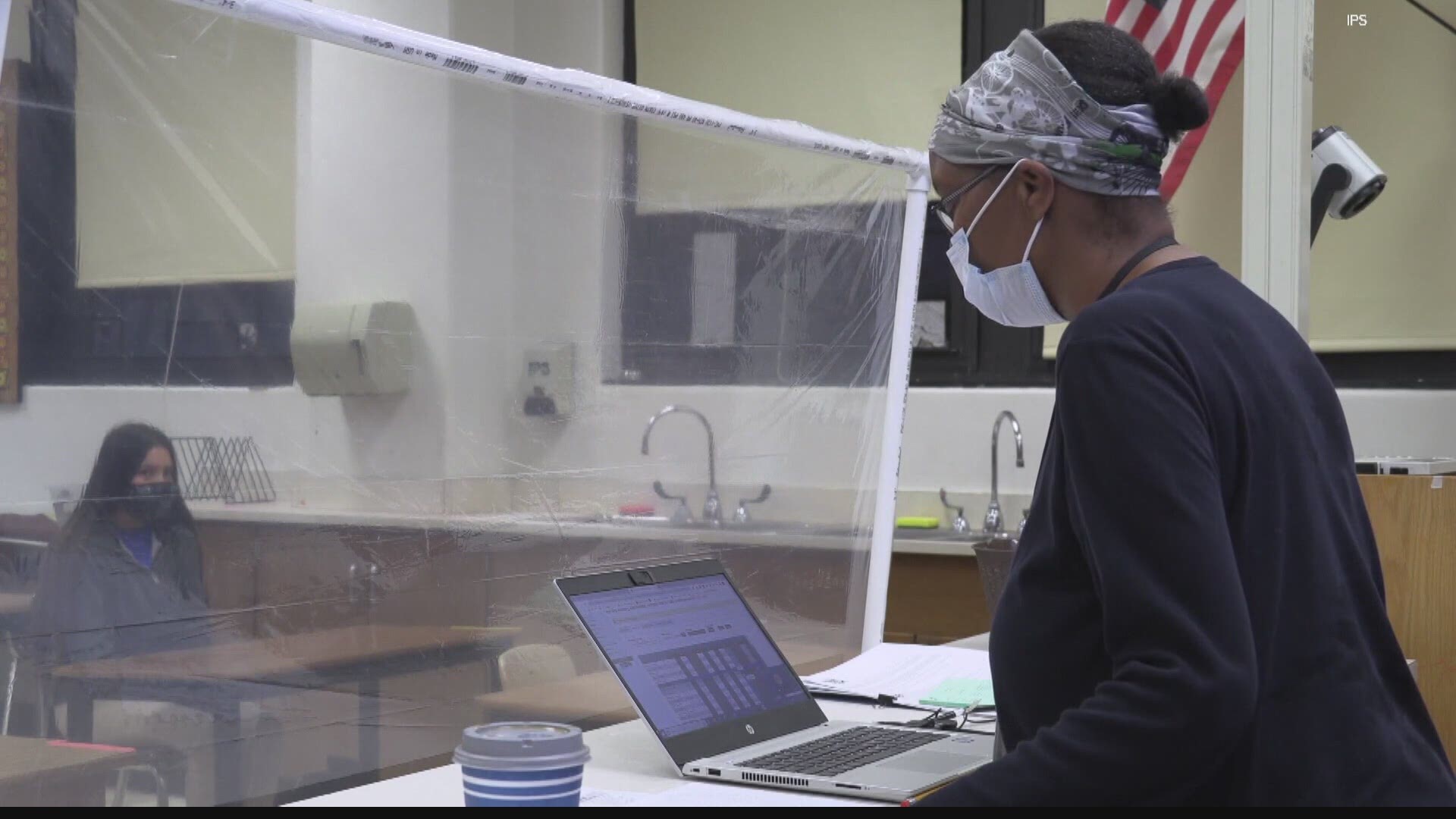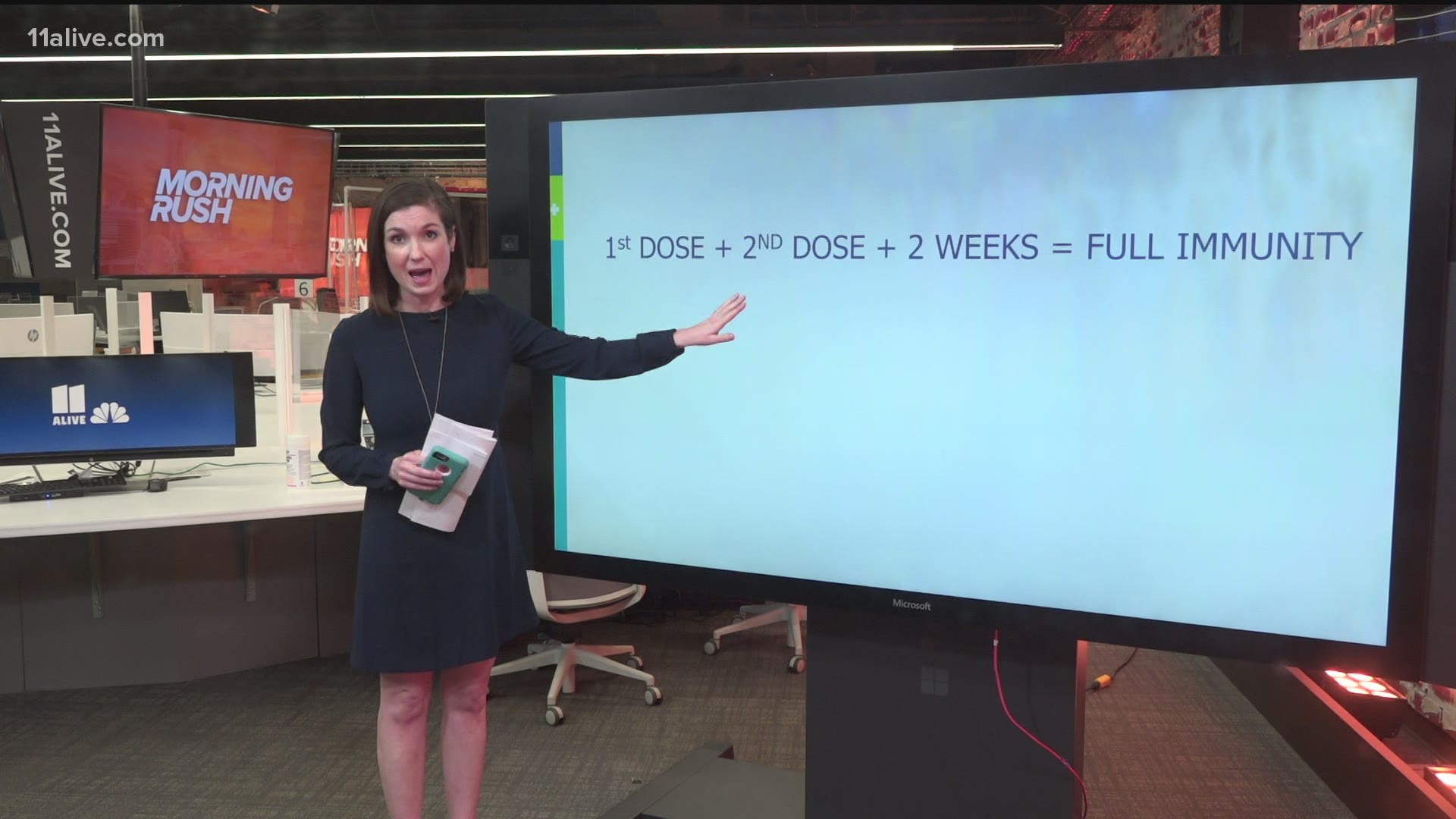INDIANAPOLIS — Friday's latest updates on the coronavirus pandemic, including the latest news on COVID-19 vaccinations and testing in Indiana. Registrations for the vaccine are now open for select groups through Indiana State Department of Health. This story will be updated over the course of the day with more news on the COVID-19 pandemic.
Indiana to get nearly $8 million from FEMA for vaccine sites
The U.S. Department of Homeland Security is sending Indiana nearly $8 million for costs related to the state's response to the COVID-19 pandemic.
The money is an advance payment for eligible reimbursable costs associated with operating more than 200 vaccination sites across the state to rapidly distribute and administer COVID-19 vaccines.
"This FEMA assistance will allow Indiana to continue its charge to vaccinate all eligible people as quickly as possible," said Steve Cox, executive director of the Indiana Department of Homeland Security. "Hoosiers are waiting anxiously to get vaccines and move beyond this pandemic, and this assistance will play an important role in helping us to return to some sort of normalcy."
ISDH daily update
The Indiana State Department of Health is reporting 1,445 new confirmed cases of COVID-19 and 86 more deaths. Indiana has recorded 646,425 total positive cases and 11,690 confirmed deaths since the start of the pandemic.
The state reported more than 45,000 additional tests Friday. Overall, there have been 7,470,213 tests administered to 3,036,554 since the start of the pandemic.
The seven-day positivity rate between Jan. 30 and Feb. 5 was 5.8 percent for all tests and 13.7 percent for unique individuals.
Fauci says masks will still be needed after vaccine roll out
Dr. Anthony Fauci said Friday people will need to wear masks “for several, several months” to avoid the coronavirus as vaccinations are rolled out.
The government’s top infectious disease expert told ABC’s “Good Morning America” Friday that by the time 75 to 80 percent of the U.S. population is vaccinated, “the level of virus in the community could be so low that you could start pulling back a bit on what are stringent public health measures.”
But Fauci said any relaxing of safety measures needs to be done “prudently and gradually.”
U.S. government researchers have found that two masks are better than one in slowing the spread of the coronavirus, but health officials have stopped short of recommending everyone double up.
Fauci said the U.S. has contracted for 600 million vaccine doses, enough to vaccinate everyone with two doses. He said as spring turns into summer, everyone should be eligible to receive a vaccine, “As we go from April to May to June and then hopefully by July, we’ll be at that point where we have enough vaccine for virtually everyone.”
Walmart, Sam's Club to begin administering vaccines Friday
Walmart and Sam's Club pharmacies will begin administering the COVID-19 vaccine on Friday, Feb. 12.
Eligible customers can schedule a vaccine appointment using the Walmart and Sam's Club websites once appointments are available. People making an appointment would need to meet Indiana guidelines, which are for people 65 and older at this point.
The federal vaccine allocation to the stores will be focused on underserved communities with limited access to health care.
New messages encourage Hoosiers to participate in COVID-19 registry
The Indiana COVID-19 Registry has been tracking and updating pandemic data from Indiana since last summer in an effort to measure impacts of the virus, anticipate health care needs and foster better understanding of how the state is dealing with the virus.
As of Friday, 460 volunteers have registered and participated in the survey. But researchers say they need more data as vaccines and variants of the virus become more widespread in Indiana.
So you may be seeing new public service announcements for television, radio and digital media that have been created to encourage more participation in the registry.
Researchers at Notre Dame, Indiana and Purdue universities partnered with the Indiana Clinical and Translational Sciences Institute and All IN for Health, to track volunteers 18 and older in the registry. Data from the registry is stored in a highly secure system built and maintained by the Center for Research Computing at Notre Dame.
The registry consists of a short introductory survey and periodic follow-up surveys in English and Spanish.
Latest US, world numbers
There have been more than 27.39 million confirmed cases of COVID-19 in the United States as of 3:30 a.m. ET Friday, according to Johns Hopkins University. There have been more than 475,000 deaths in the U.S.
Worldwide, there have been more than 107.8 million confirmed cases with more than 2.36 million deaths and 60.31 million recoveries.
The real number of people infected by the virus around the world is believed to be much higher — perhaps 10 times higher in the U.S., according to the Centers for Disease Control and Prevention — given testing limitations and the many mild cases that have gone unreported or unrecognized.
For most people, the coronavirus causes mild or moderate symptoms. For some, especially older adults and people with existing health problems, it can cause more severe illness like pneumonia, or death.
CDC to announce school reopening guidance Friday
Facing criticism that President Joe Biden has not acted aggressively enough on reopening schools, the White House on Thursday said it’s aiming for a full reopening but will defer to science experts on how to achieve it in the middle of a pandemic.
The White House drew criticism this week when it said schools would be considered opened if they teach in-person at least one day a week. Asked about it Thursday, press secretary Jen Psaki said Biden hopes to get students in the classroom five days a week as soon as it’s safe.
Psaki did not detail a timeline for that milestone, however, saying the administration will act on new school guidance that’s expected to be released Friday by the Centers for Disease Control and Prevention.
US to have enough vaccine for 300 million Americans by summer, Biden announces
President Joe Biden visited some of the nation's leading scientists on the frontlines of the fight against COVID-19 on Thursday, as he announced the U.S. will have enough supply of the vaccine by the end of the summer to inoculate 300 million Americans.
Biden toured the Viral Pathogenesis Laboratory at the sprawling National Institutes of Health complex just outside Washington that created the COVID-19 vaccine now manufactured by Moderna and being rolled out in the U.S. and other countries. He was also set to address the agency's team of researchers and scientists, who have investigated treatments for COVID-19 and other dangerous diseases.
The U.S. is on pace to exceed Biden’s goal of administering 100 million vaccine doses in his first 100 days in office, with more than 26 million shots delivered in his first three weeks. Meanwhile, Biden is moving to ease supply bottlenecks and ensure the nation has enough of the current two-dose vaccines to protect 300 million Americans.
Biden announced on Thursday that the U.S. had secured contractual commitments from Moderna and Pfizer to deliver the 600 million doses of vaccine by the end of July — more than a month earlier than initially anticipated.
The pace of injections could increase further if a third coronavirus vaccine from drugmaker Johnson & Johnson receives approval from the Food and Drug Administration.
CDC: Fully vaccinated people don't need to quarantine after COVID-19 exposure
People who are fully vaccinated for COVID-19 may be able to skip quarantining if they're exposed to someone infected with the coronavirus, the Centers for Disease Control and Prevention said Wednesday.
Federal guidelines have typically recommended staying home for 14 days after having contact with someone who has COVID-19.
But in updated guidance posted on its website, the CDC said fully vaccinated individuals can skip quarantining if they meet certain criteria.
The criteria include that a person doesn't have any COVID-19 symptoms since the exposure and that they are fully vaccinated (meaning it's been at least 2 weeks after their second dose in a 2-dose series like Pfizer and Moderna, or more than 2 weeks after a single-dose vaccine).
Because it's still unknown how long COVID-19 vaccines offer protection, the third criteria is that a person is within three months of the last dose in the immunization series.
"These quarantine recommendations for vaccinated persons, including the criteria for timing since receipt of the last dose in the vaccination series, will be updated when more data become available and additional COVID-19 vaccines are authorized," the CDC said on its website.
If a fully vaccinated person meets all the criteria and does not quarantine, they should still closely watch for COVID-19 symptoms for 14 days after they've been exposed.


